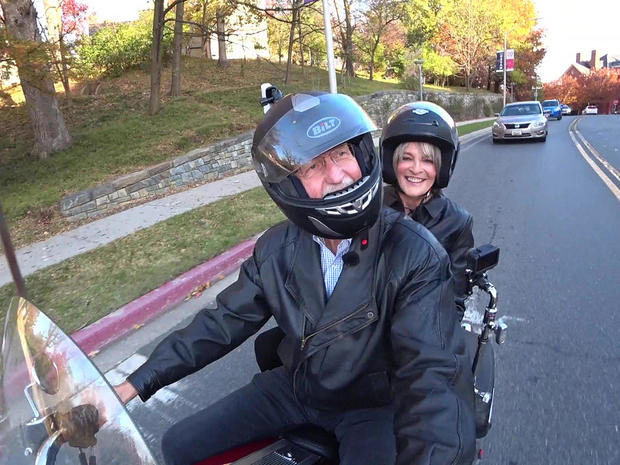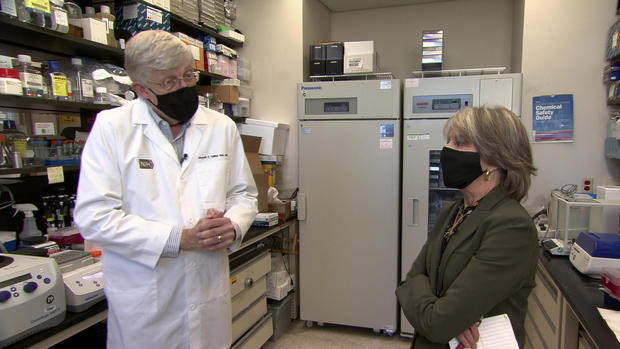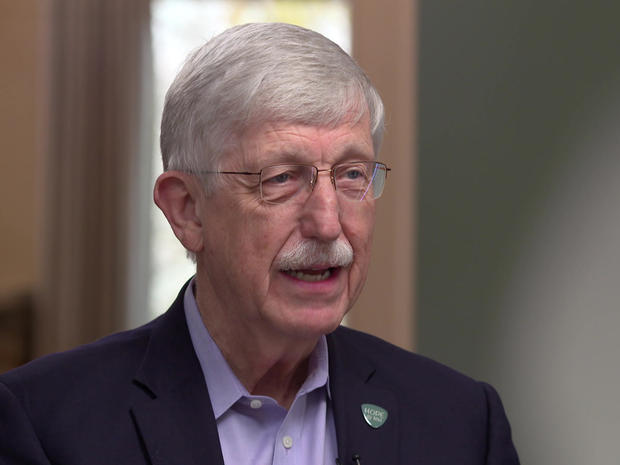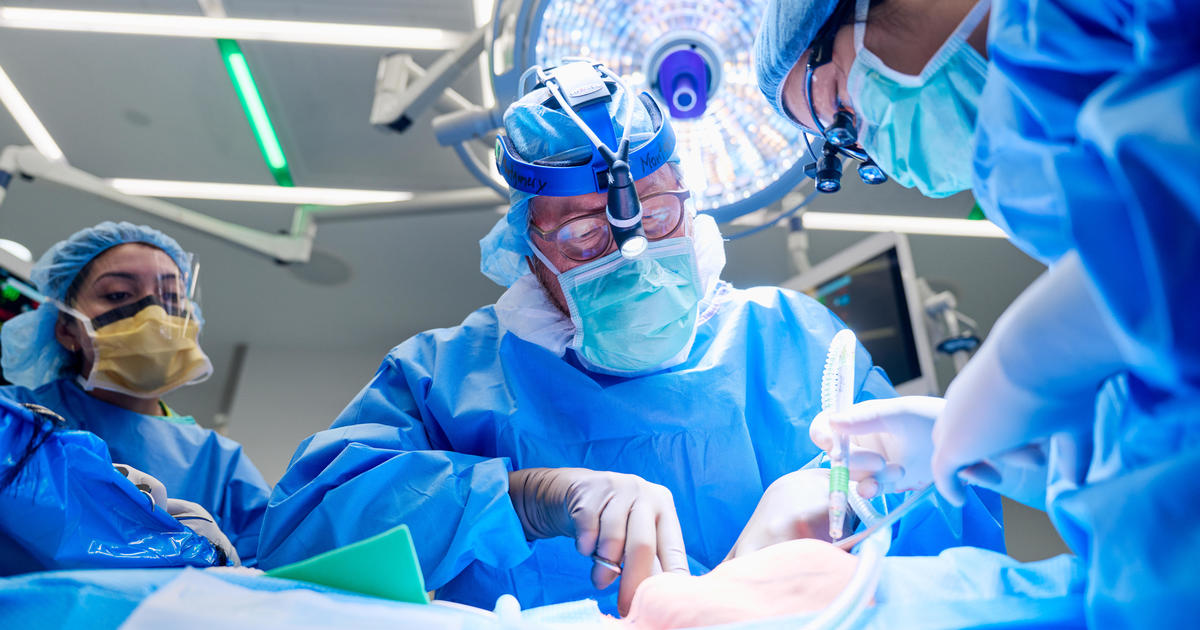NIH director Dr. Francis Collins on a life in science
For Dr. Francis Collins, the adventure of owning a Harley is nothing compared with the challenge of running the sprawling National Institutes of Health: "We have 27 institutes and centers," he told correspondent Rita Braver.
"They range everything from institutes that are focused on a disease – the National Cancer Institute – to some that are focused on organ systems – the National Eye Institute, for Infectious disease, heart, lung and blood. And I've had a pretty good time getting the best people in the world to come and lead those institutes."
But now, after 12 years on the job – one of the longest runs in history – Collins will step down today.
"I have loved this role. But 12-plus years is a long time to have a single leader of this largest supporter of biomedical research in the world. It's good to have new vision."
It was Collins' own vision, as one of the foremost genetic researchers in the country, that inspired then-President Barack Obama to appoint him to lead NIH in 2009. Collins helped push through major increases in the NIH budget, now expected to hit $50.4 billion a year.
Collins said, "I have done everything I can to stay out of any kind of political, partisan debates, because it really is not a place where medical research belongs."
That may be why both Presidents Trump and Biden asked him to stay on. But Collins revealed that once the COVID pandemic began, he found himself facing off with Mr. Trump over Collins' refusal to endorse scientifically-disproven remedies, like hydroxychloroquine and blood plasma from recovered COVID patients. "And I got into a difficult place, and got a bit of a talking-to by the President of the United States about this," Collins chuckled. "But I stuck my ground."
Braver asked, "Would you have resigned if it had come to the White House trying to get you to do something you didn't want to do?"
"Yeah, I was not going to compromise scientific principles to just hold onto the job," he replied.
And Collins has resisted demands from the right for him to fire one of his key team members: Dr. Anthony Fauci: "Can you imagine a circumstance where the director of the NIH, somebody who believes in science, would submit to political pressures and fire the greatest expert in infectious disease that the world has known, just to satisfy political concerns?"
Collins is proud of work by NIH scientists that helped lead to the development of COVID vaccines. But still, Braver asked, "Are there any things that you wish that you and NIH had done differently vis-à-vis COVID?"
"I wish we had studied more carefully the problem of hesitancy," Collins said. "I did not imagine that there would be 60 million people who, faced with compelling evidence of the life-saving nature of COVID vaccines, would still say, 'No, not for me.'"
Francis Sellers Collins, one of four boys, grew up in Staunton, Virginia, where he was home-schooled until 6th grade. "My mother and my father had this ability to inspire you about the joy of learning new things," he said.
He got a Ph.D. from Yale and an M.D. from the University of North Carolina. In 1989, he helped. discover a gene that causes cystic fibrosis. Then, in 1993 Collins was recruited to join NIH, where he would head up the government's effort in the race with a private company (led by Craig Venter) to map the human genome – all the genetic information in our DNA.
"All of this got into the People magazine version of science that I'm not sure was all that helpful, but ultimately it had a good ending," he said.
In June 2000, President Bill Clinton declared it a tie. At a White House ceremony, Collins said, "Today we celebrate the revelation of the first draft of the human book of life."
In 2007 President George W. Bush presented Collins with the Medal of Freedom, in large part because of strides that mapping the human genome made in treating diseases like cancer.
Collins said, "What particular genes are mutated that is causing this problem to happen, and how could we look at the menu of all the kinds of interventions we have – drugs, immunotherapy – and pick the right match for your cancer? The Genome Project made that possible."
And even after he became director of NIH, Collins continued to do research.
"Yeah, this is the special part of it for me," he said, showing Braver the lab where he plans to return when he steps down as director, focusing on diabetes, and a new gene editing technique to help kids with a rare disease called progeria, that causes premature aging.
"We're now trying to figure out how, in the next months or maybe a year, to do all the necessary work to start a clinical trial on kids with that condition to see what we can do," he said.
Collins' partner in all of this is his wife, Diane Baker, a pioneering genetic counselor. Braver asked her, "So, do you just, like, sit around the dinner table, discussing the latest genetic developments?"
"Actually, we do," she laughed.
In fact, Baker has become deeply involved in charities that support patient care at NIH. "We both care so much about health care and access to health care and biomedical research, and we know it's all intertwined, and necessary," Baker said.
Braver asked, "What do you think are the qualities that define your husband?"
"That's an important question," she replied, getting emotional. "The qualities that come to mind are, he is totally himself. He is totally who he is, and he brings everything he has to his work – his humor, his intellect, his music, his concern for people. He brings it all."
The music Baker mentioned is indeed a key to understanding Dr. Francis Collins – whether it's playing a duet with a young sickle cell anemia patient, or performing with other NIH experts.
Braver asked, "So, why do a bunch of very hard-working doctors and scientists want to have a rock 'n' roll band?"
"Because it's good for your soul," Collins replied.
But Collins will never stop searching for the next medical breakthrough – as he sings in "Don't Give Up On Me":
'Cause I'm not giving up
I'm not giving up, giving up, no, not yet,
Even when I'm down to my last breath….
See also:
WEB EXTRA: Dr. Francis Collins: "I don't see a conflict" between science and faith
For more info:
- Francis S. Collins, M.D., Ph.D., director, National Institutes of Health
- Progeria Research Foundation
Story produced by Ed Forgotson. Editor: Mike Levine.







